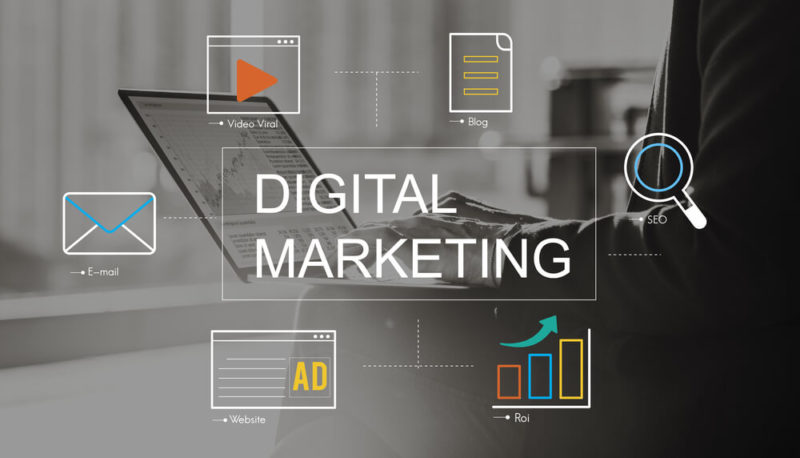Looking to pursue a career as a Digital Marketer in 2023? Don’t know from where to start?
If so, you’ve come to the right place!
This digital marketer career guide is intended to help you take the first steps toward a career in digital marketing. Whether you’re a beginner or have some experience in the digital marketing field, this guide will provide you with the essential steps, skills, pro tips and resources to help you embark on a successful career as a digital marketer.
So, let’s dive in and explore the exciting journey of becoming a digital marketer in 2023!
>> BONUS: How To Become A Graphic Designer 2023 (Step By Step Guide)
Why Pursue A Career as a Digital Marketer In 2023?

A career in digital marketing is highly rewarding and in-demand in year 2023. The industry offers diverse opportunities, including social media, blogging, email marketing, and web-based advertising. Adapting to emerging trends like AI, ML, video marketing, and voice search optimization is crucial.
The demand for skilled digital marketers is growing as organizations struggle to find qualified professionals. The field provides career progression, flexibility, and work-life balance. Pursuing a digital marketing career in 2023 means being part of a dynamic industry with ample chances for personal and professional growth.
How Much Do Digital Marketers Make?
Digital marketing salaries in the US can surpass the national average. A digital marketing manager earns an average base salary of $81,591 per year, including additional pay.
Salaries within the field vary based on specific roles.
For instance, a blog manager earns around $71,724 per year, while an SEO manager earns approximately $98,742 per year. Additional pay is included in these figures. It’s crucial to consider the role and industry when assessing digital marketing salaries.
How Much Do Freelance Digital Marketers Make?
How much digital marketing freelancers can earn per month depends on the hourly rate and the number of chargeable hours per month. The typical rate is between $50 and $200 per hour. A freelance digital marketer is a professional with the necessary skills and knowledge to offer online marketing services to clients.
What Is Digital Marketing?

Digital marketing, also known as online marketing, refers to promoting brands and engaging potential customers through various digital communication channels. These include email, social media, web-based advertising, as well as text and multimedia messages.
In essence, any marketing campaign that utilizes digital communication falls under the umbrella of digital marketing.
What Does A Digital Marketer Do?
A digital marketer implements marketing campaigns to promote brands and acquire customers in the digital realm. They conduct market research, collaborate with marketing professionals, and create compelling content.
Utilizing digital channels like email, search engines, social media, and websites, they focus on brand awareness and website traffic. Digital marketers are also involved in content strategy, SEO and SEM optimization, e-commerce conversion, and managing the brand’s online presence through social media.
Digital Marketer: Roles & Responsibilities
The role of a digital marketer encompasses various responsibilities related to promoting a company or brand and its products or services in the digital space. Here are the key roles and responsibilities of a digital marketer.
Brand Awareness
A digital marketer is responsible for creating brand awareness through digital channels. They develop and implement marketing campaigns to increase the visibility of the brand among the target audience.
Website Content Strategy
Digital marketers are involved in creating and implementing content strategies for websites. They ensure that the website’s content aligns with the overall marketing objectives and effectively communicates the brand’s message.
Search Engine Optimization (SEO) & (SEM)
Digital marketers optimize websites and their content to improve their visibility on search engines. They utilize SEO techniques to enhance the website’s ranking in search engine results and use SEM methods, including paid advertising, to drive relevant traffic to the website.
Optimize for E-commerce
Digital marketers focus on converting website visitors into online sales. They work towards providing a seamless and user-friendly online shopping experience, ensuring that the website is optimized for e-commerce transactions.
Social Media Management
Digital marketers may manage the online presence of the brand on various social media platforms such as Facebook, Twitter, Instagram, and LinkedIn. They create engaging content, interact with the audience, and keep them updated about the brand’s offerings and promotions.
Analytics and Reporting
Digital marketers use web analytics tools to measure the effectiveness of marketing campaigns, track website traffic, and gather insights for optimization. They analyze data and prepare reports to evaluate the performance of digital marketing initiatives.
Keeping Up with Digital Trends
Digital marketers stay updated with the latest digital marketing trends, tools, and technologies. They continuously learn and adapt to new strategies and platforms to ensure the brand remains competitive in the digital landscape.
Digital Marketer: Skills & Qualifications
To be a successful digital marketer, you need a combination of technical skills and soft skills. Here are the skills and qualifications typically associated with digital marketers:
Search Engine Optimization (SEO)
Understanding how to optimize websites and content to improve search engine rankings and drive organic traffic.
Search Engine Marketing (SEM)
Knowledge of paid advertising platforms like Google Ads to create and manage effective online advertising campaigns.
Social Media Marketing
Proficiency in leveraging social media platforms to promote brands, engage with audiences, and drive website traffic.
Content Marketing
Ability to create compelling and valuable content that attracts and engages target audiences.
Email Marketing
Familiarity with email marketing tools and strategies to develop effective email campaigns and nurture leads.
Web Analytics
Proficiency in using tools like Google Analytics to track website performance, analyze user behavior, and make data-driven decisions.
Conversion Rate Optimization (CRO)
Understanding of CRO techniques to optimize websites and landing pages for higher conversion rates.
Marketing Automation
Knowledge of marketing automation platforms like HubSpot or Marketo to streamline marketing processes and nurture leads.
Digital Advertising
Familiarity with various digital advertising channels, such as display ads, video ads, and remarketing campaigns.
Data Analysis
Ability to analyze marketing data and derive insights to improve campaign performance and ROI.
Where Do Digital Marketers Work?
Digital marketers work in various industries and organizations where their skills in digital marketing are needed. Here are some places where digital marketers commonly work:
Marketing Agencies
Digital marketers often find employment in marketing agencies that specialize in providing digital marketing services to clients. These agencies work with a diverse range of businesses and industries, offering services such as search engine optimization (SEO), social media marketing, content marketing, email marketing, and more.
In-House Marketing Teams
Many companies have their own in-house marketing departments or teams that include digital marketers. These teams handle the company’s marketing strategies, campaigns, and online presence. Digital marketers in such organizations work closely with other marketing professionals, designers, content creators, and analysts to execute marketing initiatives.
E-commerce Companies
With the rise of online shopping, e-commerce companies heavily rely on digital marketing to drive traffic to their websites, increase sales, and enhance customer engagement. Digital marketers in e-commerce companies focus on optimizing product listings, implementing digital advertising campaigns, managing social media accounts, and improving the overall online shopping experience.
Startups and Small Businesses
Startups and small businesses often have limited resources and rely on digital marketing to establish their online presence and reach their target audience cost-effectively. Digital marketers in these organizations handle multiple aspects of marketing, including social media management, content creation, email marketing, SEO, and paid advertising.
Technology Companies
Digital marketers are also employed by technology companies that provide marketing tools, software, or services. These companies require digital marketers to promote their products or services, create engaging content, and develop marketing strategies tailored to their target audience.
Media and Entertainment Industry
Media companies, including publishing houses, television networks, and movie studios, employ digital marketers to promote their content online, engage with audiences on social media platforms, and drive viewership or readership.
Nonprofit Organizations
Nonprofit organizations also utilize digital marketing to raise awareness about their cause, attract volunteers, and drive donations. Digital marketers in nonprofits focus on creating impactful campaigns, managing social media channels, and optimizing online donation platforms.
Step By Step Guide To Become A Digital Marketer

In today’s digital age, businesses are increasingly relying on online channels to reach their audiences, making digital marketing a highly sought-after skill set. This guide will provide you with the necessary information, resources, and strategies to embark on a successful career in digital marketing.
1. Learn Digital Marketing Fundamentals
To begin a career in digital marketing, it’s important to acquire core technical competencies in SEO and SEM, analytics, social media marketing, and email marketing. You can gain these skills through programs like BrainStation’s Digital Marketing bootcamp. It’s also essential to develop soft skills such as leadership, strong writing voice, and understanding of the online landscape.
Digital Marketing Fundamentals
Digital marketing fundamentals encompass essential principles and techniques for a successful strategy. Key areas include SEO to improve search engine visibility, SEM for paid advertising, social media marketing for engagement and brand awareness, content marketing to provide valuable information, email marketing for nurturing relationships, and web analytics for data-driven decisions. Understanding these areas is crucial for aspiring digital marketers.
>>Pro Tip: Watch Free Digital Marketing Fundamentals Course below.
2. Familiarize with Key Digital Marketing Tools
Having experience with various digital marketing tools will make your journey as a digital marketer easier. Some important tools to learn include:
1. Google Analytics and Google Ads:
These tools allow you to measure and track the performance of your digital marketing campaigns. By linking Google Analytics and Google Ads, you gain insights that help you understand the effectiveness of your ads in driving conversions. This integration also enables optimized bidding and customized messaging based on audience segments.
>>Pro Tip: Free Google Ads Certification Courses by Google
>>Pro Tip: Learn analytics with free online courses by Google
2. SEO tools like Ahrefs, Moz, and SEMrush
These tools are essential for search engine optimization (SEO). They help you explore relevant keywords, analyze backlinks, and study competitors’ SEO strategies. Ahrefs provides comprehensive backlink analysis, keyword research, and content exploration. Moz offers features like keyword research, link analysis, and site audits to improve your website’s SEO performance. SEMrush offers competitive intelligence, keyword research, and on-page optimization tools to enhance your SEO efforts.
>>Pro Tip: Ahrefs Certification Course
3. Email campaign tools like MailChimp or SendGrid
These tools are invaluable for email marketing. MailChimp provides a user-friendly platform for creating and managing email campaigns, designing templates, and analyzing campaign performance. SendGrid offers features for email automation, personalization, and deliverability optimization to help you engage your audience effectively.
>>Pro Tip: How to Use Mailchimp to Create Marketing Campaigns
4. Customer relationship management (CRM) programs like Salesforce and Hubspot
These programs assist in managing customer relationships. Salesforce is a comprehensive CRM platform that allows you to track customer interactions, manage sales pipelines, and automate marketing processes. HubSpot offers a powerful CRM with features like contact management, deal tracking, and email integration, along with marketing automation capabilities.
>>Pro Tip: Watch Free HubSpot CRM Course below.
3. Focus on Social Media Marketing
Social media platforms like Facebook, Twitter, Instagram, LinkedIn, and TikTok are crucial for driving traffic, generating leads, and building brands. Experiment with these platforms and utilize social media management tools like Hootsuite, Later, and Buffer. Additionally, create standout content for your social media platforms by using free stock image sites like Unsplash or Pexels, and graphic design platforms like Canva.
>>Pro Tip: Hootsuite Platform Training Course
>>Pro Tip: Social Media Marketing Certification Course
4. Develop Your Content Marketing Skills
Content marketing plays a vital role in digital marketing. Learn how to produce written and audiovisual content that attracts customers to a business’s website. Familiarize yourself with search engine optimization (SEO) techniques to make your content more visible to potential customers. You can also focus on user experience (UX) and user interface (UI) design to engage your audience effectively.
>>Pro Tip: Content Marketing Certification Course
5. Stay Updated with Industry
Trends and Best Practices Digital marketing is a rapidly evolving field, so it’s crucial to stay up to date with the latest industry trends, algorithms, and best practices. Follow reputable blogs, attend webinars, and join digital marketing communities to continuously learn and grow in your career. Some useful resources include Moz, HubSpot, Search Engine Journal, and Social Media Examiner.
>>Pro Tip: Digital Marketing News & Updates
6. Gain Practical Experience and Build a Portfolio
Put your skills into practice by working on real-world projects. Look for internships, freelance opportunities, or create your own projects to build a portfolio that showcases your abilities. Practical experience is highly valued in the digital marketing industry and can increase your chances of getting hired.
>>Pro Tip: Digital Marketing Internship Jobs, Employment
Remember, digital marketing is a diverse field with various specializations. As you progress, you can explore areas such as social media marketing, inbound marketing, email marketing, and analytics. Continual learning and adapting to industry changes will be key to your success as a digital marketer.
How To Become A Freelance Digital Marketer?

To pursue a career as a freelance Digital Marketer, simply follow the guide I’ve outlined above. Once you’ve acquired the necessary skills, you can explore freelance platforms and work as a Digital Marketer on a freelance basis.
Being a freelance digital marketer offers several benefits: flexibility in working hours and location, a variety of projects across different industries, higher earning potential with adjustable rates, continuous professional growth and specialization, independence in decision-making and career direction, networking opportunities for collaborations and referrals, and personal satisfaction from working on projects aligned with interests and passions.
>> Pro Tip: 8 Best Freelance Websites for Digital Marketing
How to Become a Digital Marketing Specialist?
If you’re considering a digital marketing career, you have the option to specialize in one of four areas: SEO, PPC, social media marketing, or become a digital marketing specialist. These paths offer diverse opportunities and high-demand skills.
Specializing in SEO provides expertise in staying up-to-date with search engine algorithms. PPC requires strong analytical skills and attention to detail. Social media marketing leverages the widespread usage of social platforms.
Choosing to be a digital marketing specialist offers a comprehensive understanding of various channels and the ability to make informed decisions. Training programs cover advanced web analytics, SEO, PPC, social media, and more.
Job Opportunities As A Digital Marketer
Digital Marketing Specialists
These professionals specialize in various aspects of digital marketing, such as search engine optimization (SEO), search engine marketing (SEM), social media marketing, content marketing, and email marketing.
Digital Account Executives
Digital account executives are responsible for managing client accounts and executing digital marketing campaigns. They collaborate with clients to understand their goals and develop strategies to achieve them through digital channels.
Social Media Managers
Social media managers are responsible for managing and executing social media strategies for businesses. They create and publish content, engage with the audience, analyze performance metrics, and monitor social media trends to optimize brand presence.
Content Creators
Content creators are responsible for developing engaging and relevant content for various digital platforms. They may write blog posts, create videos, design infographics, or produce other forms of content to attract and engage the target audience.
SEO Specialists/Strategists
SEO specialists focus on optimizing websites and online content to improve their visibility in search engine results. They conduct keyword research, implement on-page and off-page optimization techniques, analyze website performance, and make recommendations to enhance organic traffic.
Marketing Data Analysts
Marketing data analysts analyze and interpret data to derive insights and make data-driven marketing decisions. They work with tools and techniques to collect, clean, and analyze marketing data, generate reports, and provide actionable recommendations to optimize marketing strategies and campaigns.
Content Strategists
Content strategists develop comprehensive content strategies aligned with business goals. They conduct content audits, define target audience personas, plan content creation and distribution, and ensure consistency across different channels. Their goal is to create valuable content that attracts, engages, and retains customers.
Digital Marketer Salaries By Country
As you can see there’s huge demand across the world for digital marketers but the average salaries can vary widely between countries. The average salary* for a digital marketing specialist in US dollars is:
- Philippines: $6,362
- United Kingdom: $43,384
- India: $4,468
- Australia: $58,374
- Canada: $40,141
- Ireland: $49,557
(*These salaries from Payscale, November 2021)
Frequently Asked Questions About Becoming A Digital Marketer
What is a digital marketer?
A digital marketer is responsible for promoting a business and its products using online channels. They have extensive knowledge of social media, search engines, websites, and online advertisements to generate sales leads, increase website traffic, and build brand awareness. They combine creativity, social advertising, and data analysis to optimize a company’s online presence
Would my business benefit from digital marketing?
Definitely. Digital marketing allows businesses to connect with prospects and customers through channels like search engines, social media, email, websites, and apps. Having an online presence on these platforms is crucial as it provides access to the majority of consumers and allows businesses to engage with their target audience at all hours of the day
How do I become a digital marketer with no experience?
A digital marketing expert is an individual with a comprehensive understanding of the online marketing landscape and all the digital marketing techniques, advertising platforms, and processes involved. To land an entry-level digital marketing job, you’ll need to understand these essential digital marketing concepts, terms, and processes.
How long does it take to become a digital marketer?
Like many aspiring Digital Marketers, you might want to learn how to do it but worry that it will take too much time. It takes most people one to three months to learn the different digital marketing tools and techniques, and it takes six months to a year to perfect those skills through practice.
Remember, this guide serves as a starting point, and your determination, passion, and commitment will be the driving forces behind your success. Best of luck on your journey to becoming a highly skilled and sought-after digital marketer!
Michael Diasz Kirindage



